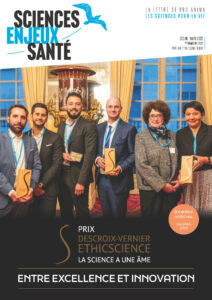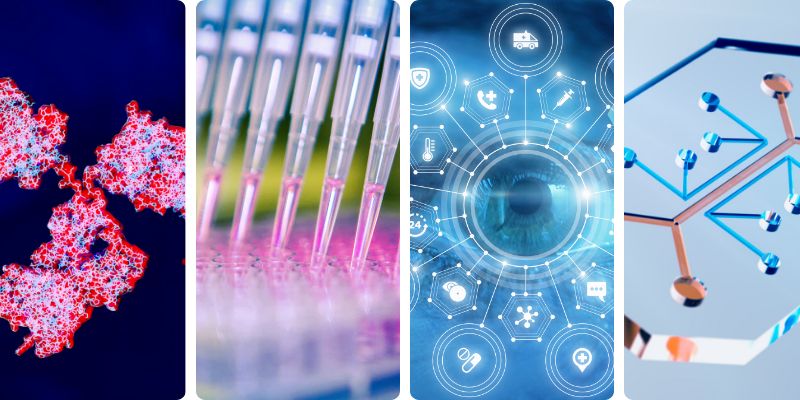
Relocation pack for NETRI, Wyss Institute : the ReConstruct project, IDIES Symposium 2023 and others
News on non-animal methods
Nov. 6 - 10, 2023NETRI, French leader in organs on a chip, benefits from financial support from the Auvergne-Rhône-Alpes region
NETRI announced on November 2, 2023 that it had obtained a subsidy of a significant amount, through the “Relocation Pack – Train employees” as part of the Strategic Relocation Plan of the Auvergne-Rhône-Alpes Region, aimed at support its industrial development and train its employees.
Based on 10 years of academic research work, NETRI was founded in June 2018 in Lyon in the heart of the Gerland biodistrict. French leader in organ-on-a-chip technologies, NETRI designs and produces all of its devices within its pilot production units installed at the Lyonbiopole Innovation Center and markets its solutions and services in France and internationally.
Rio de Janeiro, November 6 to 9, 2023 : 1st Brazilian Congress on alternative methods to the use of animals
The use of animals dates back centuries, but with each scientific advance it becomes clear that animals are beings who feel pain, suffer and have all the feelings inherent to human beings, but express them only in a different way.
Therefore, concerns regarding the use of animals in research and education have increased from time to time, and increasingly, technological development has provided new techniques and approaches that contribute greatly to the growing trend to replace the use of animals.
Brazil already has an important history of participation in national and international events and commissions on the theme of alternatives to the use of animals, so now is the time to bring together as many researchers and students as possible to show their work, update each other and discuss new paths forward.
UK’s biotech firm ImmuOne bags €2.2M to scale up 3D human lung model for drug testing
UK-based ImmuOne, a biotech company that has developed a 3D human lung model to replace animal testing, announced that it has raised €2.2M in funding from MEIF Proof of Concept & Early Stage Fund, EIS funds and Pioneer Group.
ImmuONE enables companies developing new products such as drugs, chemicals, or cosmetics to meet legal requirements by showing they are safe to be inhaled.
“Our model not only enables companies to move away from animal testing but also improves safety for patients too. We look forward to working with many more clients and scaling the business with a view to global expansion in the future,” ImmuOne CEO and co-founder Dr Abigail Martin adds.
Wyss Institute : the ReConstruct Project is leveraging patient-derived, vascularized tissue to improve the safety of breast reconstruction
The ReConstruct Institute Project team at the Wyss Institute, led by Luba Perry, is on a mission to solve that unmet need and help survivors live empowered, healthy lives. Harnessing innovations from the Wyss Institute’s 3D Organ Engineering platform, ReConstruct creates living adipose tissue implants derived from a patient’s own cells.
A technique called SWIFT is used to “draw” a network of 3D channels through the tissues to maximize blood flow to its cells. Then, the team uses a proprietary suturable cuff to ensure that the newly implanted tissue can immediately integrate with the patient’s blood supply.
Wyss Institute : Human Lung Chip leveraged to faithfully model radiation-induced lung injury
The lung is one of the tissues most sensitive to radiation in the human body. People exposed to high radiation doses following nuclear incidents develop radiation-induced lung injury (RILI), which affects the function of many cell types in the lung, causing acute and sustained inflammation, and in the longer term, the thickening and scarring of lung tissue known as fibrosis.
Anti-inflammatory drugs given to patients during radiation therapy can dampen the inflammation in the lungs, called pneumonitis, but not all patients respond equally well.
Now, a multi-disciplinary research team at the Wyss Institute for Biologically Inspired Engineering at Harvard University and Boston Children’s Hospital, led by Wyss Founding Director, Donald Ingber, M.D., Ph.D., in an FDA-funded project, has developed a human in vitro model that closely mimics the complexities of RILI and radiation dose sensitivity of the human lung.
Human life-like in vitro model of radiation damage sustained to the lung opens an unprecedented window into the early disease process, and opportunities for drug development
MPS 2024 Awards and Travel Grants
The MPS World Summit 2024 Conference Organizers are pleased to announce several awards for the MPS World Summit in Seattle, Washington.
The Conference Organizers will award up to 20 Student and Postdoctoral Researcher Travel Awards (including waived registration fee). A maximum of 5 will be awarded to domestic (Europe) undergraduate and graduate students and 5 to domestic (Europe) postdoctoral researchers. A maximum of 5 will be awarded to international undergraduate and graduate students and 5 to international postdoctoral researchers.
The submissions are open till : 15 janvier 2024
China, Nanjing, Nov. 10th-12th, 2023 : International Symposium on Microphysiological Systems
The conference aims to explore the latest research trends in microphysiological systems, including organs-on-chip, organoids, biomedical big data, and showcase the most recent research achievements. It provides a platform for academic, industry, and research collaboration in the field of microphysiological systems. Together, we aspire to advance microphysiological systems research and industrial development in China to new horizons.
Among the foreign speakers :
- Danilo A. Tagle : Director, Office of Special Initiatives at the National Center for Advancing Translational Sciences (NCATS) of the National Institutes of Health (NIH), USA
- Thomas Hartung : Director of the Johns Hopkins Center for Alternatives to Animal Testing
- Olivier Guenat : Professor, Head Organs-on-Chip Technologies, ARTORG Center for Biomedical Engineering Research, University of Bern, Switzerland
- Lena Smirnova : Assistant Professor of Environmental Health and Engineering at Bloomberg School of Public Health, Johns Hopkins University
- Yong Chen : Professor of Ecole Normale Supérieure (ENS); Directeur de Recherche (1st class) of CNRS and head of the ENS team for microfluidics, France
USA, Nov. 14 – 15, 2023 : two-day in-person workshop on Assessing Developmental Neurotoxicity (DNT) Using New Approach Methods (NAMs)
The rise in reported neurodevelopmental impairments in infants and children is suspected to be caused, in part, by exposure to certain compounds during the pre- and postnatal periods.
To address the challenges associated with traditional in vivo DNT testing guidelines, there has been increased focus on developing new approach methods (NAMs) and other concepts [e.g., adverse outcome pathways (AOPs)] based on non-animal testing to assess the potential DNT effects of compounds on humans more efficiently.
CFSAN (Center for Food Safety and Applied Nutrition) seeks to bring together experts in DNT to discuss the current state of the science on the development and use of alternative approaches to animal testing (e.g., in silico, in chemico, in vitro, and non-mammalian whole organisms) and considerations to optimize their application in regulatory decision-making.
IDES Annual Symposium 2023
The IDIES Annual Symposium aims to bring together experts in the theoretical foundations, development, and application of data-intensive technologies and analysis to share discoveries, practical ideas, and insights as they relate to big data research.
The following video features a selection of talks from the 2023 Annual Symposium held on October 13th, 2023 in Baltimore, MD.


